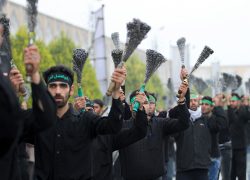admin
admin
Published posts

A Conversation with Hamidreza Soleimani, Painter
Design Your Wings So You Can Fly When Needed
With hands full of colors and a keen eye, he creates a new world on a blank canvas. Every brushstroke paints his emotions—as if the colors speak the language of his heart. In the silence of his studio, dreams come alive, and moments become eternal in frames of paint.

Silver Smithery
The Silver of Sepahan
Silver dishes have a special position for the people of Isfahan; you may find the decorative dishes or the mirror and silver candlesticks in the homes of the brides in traditional families.

The Art of Hammer and Burin
The sound of hammer and burin is heard from the engraving workshop of Imam Mall and the craftsman is busy working.

Isfahan Set to Forge Sister City Relationship with Aleppo, Strengthening Cultural Ties and International Cooperation
The city of Isfahan, renowned for its rich cultural heritage and historical significance, is poised to establish a sister city relationship with Aleppo, Syria. This significant proposal was thoroughly reviewed and subsequently approved during a public session of the Isfahan City Council on September 29, 2024. Following this approval, the Isfahan Municipality will initiate the necessary steps to formalize the agreement in accordance with established legal and administrative protocols.

Science of Isfahan
People of Science and Literature in Isfahan
The permission to establish foreign schools in Iran was issued from the time of the Muzaffar al-Din Shah Qajar, which was set up by the “Stuart Memorial College” or the “Adab” High School in Isfahan, “Mehraeein” in Yazd, and the “College of the British” in Kerman.

A Travelogue of Isfahan:
The Safar-name of Naser Khosrow
From Basra to Isfahan is 1100 km . Isfahan is a town situated on savanna.

98Wise crack and sense of humor of Isfahanian
humorist servant
Timur Lang took a great deal of pleasure in his servant company and also he enjoyed talking to him, even though he were not safe of his servant`s wise cracks, and he always accompanied him.

ISFAHAN MONUMENT
Ghushkhane Garden
Vertance Yuzukchian, one of the religious authorities of Jolfa of Isfahan during Mohammad Shah Qajar period, witnessed strange matches in Ghushkhane garden.

School and Tomb of Abu Ali Sina
Ibn Sina school
In the year 414 Ah, a man in sufi dress, from Isfahan`s Bidbakhshan and Bidabad neighborhood entered Isfahan. This man was an important scientist, the philosopher and doctor of Iranian history.

Isfahan’s Old Plane Trees
The Hundreds of Years Old Witness
Bagh, Chaharbagh and hundreds of years old plane trees are some of the unique characteristics of Isfahan, which every tourist and visitor confirms.

Monuments of Isfahan
Ali Mosque’s Minaret
One of the highest minarets in Isfahan is the “Ali Mosque” minaret. This monument was built during the time of Sultan Sanjar Seljuki. About the minarets and rods of Isfahan, there are many folk tales.

Monar Jonban
The Two Shaking Minarets
One of the monuments that has always attracted the attention of domestic and international tourists is the “Monar Jonban”.





